|
Microwave Fudge
3 6oz bags semi sweet chocolate chips 14 oz can sweeten condensed milk Dash of salt 1 1/2 tsp vanilla 1/2 cup chopped nuts - Walnuts Melt chocolate & milk in glass dish in microwave 1 min at a time (do not over melt) When that is melted add vanilla, salt & nuts Put in wax paper lined 8X8 or 7X7 pan. Put in fridge for 1 hr. Cut and store in a tight container. Variations: use different chips, toasted coconut, almond, peanuts Cranberry Salsa with Lime makes about 4 cups 1 12 oz pkg fresh cranberries – picked over and stemmed* 2 large ribs of celery – finely diced 1 small white onion finely diced 1 jalapeno pepper – seeded and minced ¼ cup chopped cilantro ½ tsp salt ¾ cup sugar 3 Tbs fresh limejuice (1 lime) Process berries in food processor until coarsely & evenly ground Transfer berries to a medium bowl & add rest of ingredients Stir well to combine – cover & refrigerate Salsa is best if made several hours ahead of serving, or up to one day Tip: freeze fresh berries first & then let them thaw partially before using Peanut Butter Balls 3 cups Rice Krispies ½ cup softened butter or margarine 1 pound powder sugar 28 oz Peanut Butter, Chunky Lightly crumble Rice Krispies Mix cereal, butter, sugar and peanut butter Form into balls Chill 2 hrs on cookie sheet. Melt 2 8 oz Hersey bars, 12 oz chocolate chips and 2/3 stick of paraffin wax Put tooth pick in center of each ball and drop in chocolate, place on wax paper till hardened Store covered. Freezes well.
0 Comments
Though our allegiance is first to Jesus Christ, we believe our faith calls us to participate in the political process, particularly through exercising our right to vote. At First Presbyterian Church, we particularly marked this year's election with an Election Day Communion service after the polls closed on November 6. Knowing that campaigns and elections often have the power to divide us, we served one another at the table to remember that in Christ, we are ONE. On November 6, President Obama was reelected to serve another term in office. The president carried the keys states of Ohio, Pennsylvania and Wisconsin and won California’s 55 electoral votes to achieve the 270 electoral college votes needed to win his battle against Republican Mitt Romney.
Republicans retained control of the House of Representatives, while Democrats stayed in charge of the Senate and the White House in Washington, DC. As the Lord leads, please pray:
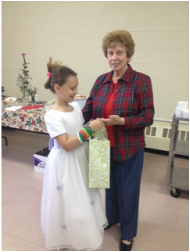 On September 16, we tried 8 different chili recipes and voted on the best one. Last year's champ Carol Swanson took the year off to make sure someone else had a chance for the title. This year, Joyce Macfarlane's chili took first place. We're grateful for all the folks who donated a recipe of their best batch and for those who put on the event. The proceeds raised will be given to the Facility Enhancement fund to put finishing touches on the back of the sanctuary. Try Joyce's chili at your house, now that the weather has turned to fall! Scarecrow Chili from Taste of Home
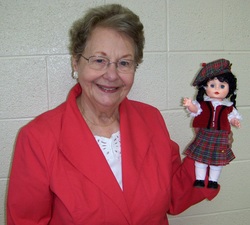 Judy Webb shows off the winning doll. ...the Scottish Lassie. Dressed by Ann Hamilton and named "Heather" after her daughter, this doll was the winner in the congregational vote for best dressed doll. The dolls were displayed on August 26 in Fellowship Hall, where worship also took place during the final phases of construction in the sanctuary. We were able to offer a blessing to the dolls, those who made their beautiful clothes and the children who will receive them this Christmas. Goodfellow Dolls are given out each holiday season to needy children in the area so that they can enjoy a wonderful Christmas gift, made with love.
The committee itself had taken a lukewarm view of many of the ideas in it. The GA agreed with their view and chose not to try any of the really new ideas, such as non-geographic presbyteries or doing away with synods. Instead, it was agreed to create a commission to try to reduce the number of synods overall, but not to do away with them completely. This move basically meant we didn't shake much of anything up. We know the church is struggling, but we don't want to try anything too scary regarding our organization in order to try to fix it. Although I, too, was worried that some churches might try to form a non-geographic presbytery just because they all agreed on a few theological issues, I though the Commission's recommendations were worth a shot. The recommendation was just to try it until 2020, and if it didn't work, we could go back to the way it used to be. I supported the idea, in part, because the work of the Mid-Council Commission was so thorough and far-reaching, and their results...frankly, terrifying. If we continue to shed members at our current pace, the entire denomination might be out of members in less than 20 years. That is worrisome - not because God really needs a Presbyterian church, but because I believe our tradition offers something unique to the whole body of Christ. And selfishly, because I make my living serving God through it and I would like to continue to do so. This GA decided that we need to try new things, but not things like this.
Middle East issues were the next major topic on the agenda. This was about whether or not our church should divest its monies from 3 companies who operate in the Occupied Territory in Israel/Palestine, and whose business is (perceived by many to be) in violation of human rights. Each morning before the business started, we often heard greetings from ecumenical and interfaith leaders from around the world. Before this vote, a prominent Jewish Rabbi was invited to do a greeting. Unfortunately, he abused his invitation and spent about 10 minutes telling the body why it would be incredibly damaging for Presbyterian/Jewish relations if we voted to divest. Although he is entitled to his opinion, using his greeting to persuade us of it was an inappropriate attempt to sway the vote before we had even had open discussion on the topic. As soon as he got on that topic, I was furious and couldn't understand why the moderator didn't step in to respectfully tell him he needed to stop. Perhaps the moderator was worried about how such an action would be perceived. However, nothing was ever done to rectify the situation or present a similar voice on the other side. Though we were told that a Palestinian had been invited to come to GA, he could not attend because of visa issues. That alone tells us how difficult it is for Palestinians to have freedom of movement. With the stage set, we took up the committee's recommendations which were overwhelmingly in favor of divestment. Most of the arguments remained focused on the Jewish/Presbyterian issues, rather than the actual issues Palestinians face or what our Christian brothers and sisters had asked us to do. Through some challenging parliamentary moves, the main issue on divestment was eventually replaced with a substitute motion to focus on "positive investment" in Palestine. That substitute motion passed (and thereby the plan to divest was defeated). While positive investment sounds really nice, it is impossible to carry out in reality. The church has looked for ways to invest in Palestinian businesses, but there are no major companies able to operate there. Israeli rules and regulations simply won't allow it. The only kind of commerce going on is small arts and crafts and a bit of olive oil production, which is not sufficient to garner the kind of investment folks are seeking to make. In the end, we also agreed to a boycott of a few specific products made in the Occupied Territories, including Ahava cosmetic products and certain dates grown in the region (often marked King Solomon). The market share of these products is so limited however, and since most of us don't buy them anyway, the impact will be relatively insignificant. I was really disappointed about the entire outcome. Money is such a powerful issue in our culture, and agreeing to keep it invested in companies we know are using it in ways that are against our faith seems ultimately unfaithful. I know the actual amounts of money we have in the companies are small, and I know that relations with some Jewish groups might become challenging, but I also believe that Jesus calls us to do the hard things, the unpopular things that also point toward justice. It was agreed to take up the marriage issues at 2pm on Friday. The theory was that if we started this issue "early" enough, we would finish our business on time. Ha! This debate began at 2pm and lasted til 5pm. Then we ended up working until 1:30am on Friday with all the other business, and we still weren't finished. Things continued Saturday, but it was really tough to get through everything before us. My committee's report began with the amendment to the Book of Order that would have changed the definition of marriage to be between two people, rather than between a man and a woman. However, there were two substitute motions that were presented to replace that recommendation. One was a mandate to the church to study issues of marriage, but it recommended a delay in hearing the outcomes of the study for 6 years. Many who were opposed to this study called it just "kicking the can down the road." The other substitute motion sought to strengthen the language in the current BoO regarding one man and one woman. Since I had sat on the committee, I wanted to be able to speak to the motions on the floor. I went to the microphone and began waiting in line right when the report started. The process for speaking is that there are 8 microphones. You check in with the person at each mic, and depending on whether you are speaking for or against the motion, you hold up a green or red paddle. Then you wait to be called on. Sometimes you wait and wait and wait. I stood in line for no less than three hours in order to speak for 60 seconds. The lines at each mic were 10-20 people deep, since this issue was so important. When it was my turn, I recommended approval of the Authoritative Interpretation (see Part 2 for a refresher on this), and spoke about how our international mission partners might respond to a change in our definition of marriage. There is much concern that some global church partner denominations will choose to break communion with us if we do make a change, because they perceive us to be doing something we shouldn't be. However, I spoke with a number of people who said that some global denominations already did this over our change in ordination standards. Though the "official" line is that they are no longer in partnership, many individual presbyteries and churches are still participating in faithful and fruitful ministries, particularly in Ghana and Mexico. I though it was important for people to know that relationships founded in Christ, where actual church members know each other, are not so easily broken over doctrinal or policy differences. My time serving in Africa leads me to believe that relationships are the most important thing. In the end, neither substitute motion was accepted and we still voted on the amendment. The Young Adult Advisory Delegates (whose votes "advise" - they aren't counted in the official total) advised us to approve the change. However, the overall vote was again razor thin, but was in the negative. We then moved on to the groups request for a study (different than the one mentioned above), which was moved to "answer all business." That meant that we would not vote on any of the other overtures - our vote on the study would be the final word on everything. This study was a piece of new business the committee approved. It asked the church to study marriage for a period of two years, so that more discussion could be had a the next GA in 2014. First, many of us tried to pull out the AI so that it could still be voted on separately. I felt this was important and was a way to stop the judicial procedures against pastors. The AI was not pulled out, so the last vote regarding marriage issues was on the study. This passed, so it now falls to US to choose whether or not to study marriage in all its forms and have a deeper conversation on this issue. You are probably worn out reading this. We are all incredibly worn out debating these issues. Truly GA was one of the most exhausting and challenging weeks I've had. I came away feeling disappointed. I felt that the church had a number of opportunities to try new ways of "doing" church, to stand up for justice even when that is risky, and maybe to open ourselves just a little to people who have often been un-loved by the church, the LGBT community. We passed lots of other interesting studies and measures. But I basically felt like we came out with a status quo position. And the status quo is not helping our church find a new identity or serve God in refreshing ways. The PCUSA is still doing plenty of faithful work. But we aren't adjusting to new cultural realities, which means we are being left behind. I know there are lots of reasons why this is the way GA went: fear, worry about a schism in the church, differences in Biblical understanding, fear, disagreements, churches still reeling from new ordination standards and a new form of government, and fear. But the angels of the Lord always come and tell us "Do Not Be Afraid." And that's for all of us: those of us who are afraid the church will stagnate and die, those who are afraid we are becoming too liberal OR too narrow in our reading of the Bible, those who are afraid we will turn off young people if we don't marry gay people, those who are afraid we will divide as a denomination. We simply have to take heart and stop being afraid. Because there is nothing in life or in death that can separate us from the love of God in Christ Jesus our Lord. Period. 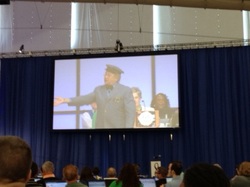 Do you recognize that photo? It's Mr. McFeely, from Mr. Rogers' Neighborhood. Fred Rogers was an ordained Presbyterian pastor whose special ministry was to serve children. He served faithfully through his PBS program for years, which was filmed in Pittsburgh, PA, the location of this year's General Assembly meeting. Mr. McFeeling made a 'special delivery' to drop in and wish us well at our meeting. Moments like those at GA are special. They remind us of the good things Presbyterians have done and are doing in the world as part of the larger body of Christ. Those moments helped sustain me during the difficult hours of working in committee. In this post, I want to share with you my experience on the Civil Unions and Marriage Issues Committee, and tell you some of the recommendations that other committees made to the full General Assembly (plenary session). Because the process is a little muddy, here's how things work: in the two years leading up to General Assembly, presbyteries may submit overtures (like a bill in Congress) to be voted on at the GA meeting. Presbyteries must receive a majority vote on their overture in order to send it to GA. This year, we received tons of overtures from presbyteries regarding changes in language in the Book of Order (our constitution), new issues of peace and justice they would like the PCUSA to support, and programs they hope the church will create. GA also receives some overtures from the church's denominational offices. Every overture is assigned to a different committee to be studied at GA. The committees are made up of commissioners elected to attend the meeting. About two and half days of the eight day GA are spent in committee. The committee has to make a recommendation to the whole body, called the plenary, about whether or not the overture should be approved, disapproved, referred for more study and/or amended in some way. The plenary hears the recommendation from the committee, allows time for debate and then makes the final vote on each overture. I served on Committee 13, which studied how we define marriage in the church. We had about 50 members on the committee. As my committee moderator said, "we were given an impossible task - to solve the issue of defining marriage for the church." Throughout most of those two days, it did feel impossible. I came really wanting to listen for the Spirit. But I also came hoping to hear something new in this debate. I have been aware of and immersed in the discussion surrounding issues of sexuality in our church for years, but was hoping that at this major event, we might discover a new path or come to some breakthrough that would lead us forward. For people who had little knowledge about the debate or really didn't know where they stood, I think there was some clarity. For others of us, it was a difficult discussion and one that we felt we had heard many times before. That made it hard to know how to move forward together. Overall, there were three choices about what we would recommend to the plenary. 1.Re-affirm the church's current understanding of marriage, between one man and one woman 2.Change the church's understanding of marriage to be between two people 3.Issue an Authoritative Interpretation (AI) that would allow pastors and churches in states where same-gender marriage is legal to perform same-gender weddings without fear of prosecution in the church disciplinary process. [An AI is a statement that tells the church how to interpret our constitution.] For two hours, we hard from people inside and outside the church in open hearings. Each one received one minute to speak about how they felt on the issue, how they are impacted by it, and how they sense God leading us. The variety of voices was wide: people who claimed to be recovering gays urging us not to change the definition, pastors who had been prosecuted by the church for marrying gay couples, young people on all sides of the issue who want the church to continue to be strong for their generation, and members who said their church will leave the denomination if we make a change. That last one, which was repeated over and over, unfortunately, felt a lot like a threat Later, we also heard from Overture Advocates - representatives from the presbyteries who had sent us the different overtures about why they were asking us to approve their recommendation. Eventually, our committee had discussions in small groups about how we were feeling and where the Spirit was leading us. On the second day, we moved into our official business and began to conduct our work by voting on what to do. Though committees rarely issue new overtures, that's one thing our committee decided to do. We agreed to recommend that the whole (congregations, presbyteries, etc.) engage in a study of marriage during the next year and half. Though this is a hopeful idea, it remains to be seen whether leaders will really take up the challenge to have such a wide-ranging and potentially contentious decision. We also voted not to re-affirm the current understanding of marriage, and also not to issue an AI. The vote on the AI, however, was very very close. Finally, we moved onto the overture changing the understanding of marriage to include two people of any gender. To everyone's surprise, that vote passed in committee by one or two votes! Together, those were the recommendations we took to the plenary session. Stay tuned to Part 3 for what happened there. For myself, I had gone in thinking that an AI was a bad idea, as it seems to take away the voice of presbyteries, since it is automatic and not voted on by the lower councils. However, I was persuaded that it actually was the right way to go. It would un-tie the hands of churches and pastors to serve the needs of their individual members with regard to weddings, and the pastoral care and worship issues involved. No one would be forced to marry any couple they did not want, just as is the case now. And, the AI would prevent costly disciplinary cases. When pastors are prosecuted in the church, congregations, presbyteries and the pastors themselves are force to spend up to a hundred thousand dollars on the case. This is money that would normally be spent for mission and other church service. Our committee was asked, "how many hungry children could $100,000 feed?" Other committees also did difficult work. There was a committee on Mid-Council Issues, tasked with acting on recommendations of a two-year study that urged us to re-organize the church's governance structures with regard to Presbyteries and Synods. The main overtures were to eliminate Synods completely, which is the third highest governing body, just below the General Assembly itself. Over the years, synods have dwindled in power and effectiveness. Doing away with them would be a new way forward, though we would need to appoint several regional bodies to participate in the disciplinary process. Second, they advised us to allow for more flexible ways to create presbyteries. Rather than always being a regional body, they wanted us to be able to organize new presbyteries around a common missional purpose (such as starting new churches, or serving an urban area, etc.) There were concerns about both of these recommendations, especially that the presbytery item would allow people just to organize around like-mindedness, furthering turning us into a factional church. Therefore, the committee recommended disapproval of both these items. Finally, the committee on Middle East Issues had another of the hot button issues. They were asked to decide whether the PCUSA would divest from (take it's money out of) companies whose business supports violence and oppression in the Occupied Territory (OT) in Palestine. A group called Mission Responsibility Through Investing (MRTI) has worked for more than 10 years to get companies who hold our money to work for peace, rather than violence, in the OT. However, three companies never agreed to cooperate and so they recommended we divest from Caterpillar, Motorola Solutions, and HP. Each of these companies makes and furnishes products that are used to destroy Palestinian homes, monitor the movements of Palestinians, and track Palestinians at checkpoints by the Israeli government, respectively. Our Palestinian Christian brothers and sisters have also asked that we divest from these companies. This issue got a lot of play in the media. Some Jewish groups said that if we divested, Presbyterians would no longer be seen as friends of Jews. This kind of thinking assumes that all Jews and all Presbyterians think alike and is not an accurate representation of what divestment means. We are still supporters of Jewish people and of Israel as a nation. We do not, however, support the way Israel has occupied the land given to Palestinians, prevented them from freedom of movement, taken away their homes, and their ability to farm their land. Divesting from these companies would simply show our disapproval of those actions. I was convinced that our church should follow the MRTI recommendations and take a stand for justice, even when it is hard to do. I also trusted the Jewish groups who supported divestment. The committee agreed with this logic and recommended by a large majority that we divest from those three companies. Remember - this is just what happened in committee. It's not exactly where things shook out with the whole plenary GA session. But it is important to remember that each committee had more time, more resources, and more preparation to study these issues than all the other commissioners, so their recommendations are certainly to be respected as well-formed and thorough. 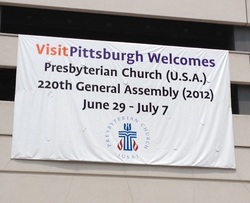 Attending General Assembly as a commissioner was an intense experience! I think I needed a couple of weeks to reflect on it before I could really consider sharing it with you. This will be the first of a short series of posts describing 1) the moderator's election and worship services 2) committee work and 3) plenary sessions. In case you're new to the PCUSA or need a refresher: General Assembly is our biennial meeting that makes decisions about our policies as a denomination. Commissioners (lay people [ruling elders] and pastors [teaching elders]) are elected from each presbytery to go and discern the leading of the Spirit as they vote and make decisions. This GA met in Pittsburgh, PA from June 29-July 7, 2012. I attended as a Teaching Elder commissioner from Detroit Presbytery. The first major task of the Assembly is to elect a new moderator. The moderator serves for a term of 2 years as the figurehead of the denomination, as well as moderating (leading) the plenary (large-group) sessions of the current General Assembly meeting. This year, there were four candidates and their vice moderatorial candidates, all of whom are Teaching Elders, or pastors. I had read up on the candidates ahead of time and was still a bit uncertain about who I would vote for. In the past ten years or so, there have been two really dynamic, exciting moderators and that's what I was basing my hopes on. Rick Ufford-Chase had been a strong advocate for peace and justice, and had tons of experience serving on the US-Mexico border. Meeting him in college was a really powerful experience. Bruce Reyes-Chow was the moderator three/four years ago and he was strongly committed to using social media to serve the church and reaching out to young people. None of this year's candidates struck me as having a strong platform in any direction. However, getting to hear each of them speak in a roundtable setting was helpful, as were the questions from the floor during the plenary session. The one candidate I was most interested in was the Rev. Neal D. Presa who is a pastor in Elizabeth Presbytery in New Jersey. He was really focused on unity in the church. Neal's vice-moderator candidate was the Rev. Tara Spuhler McCabe. It had come out in recent weeks that Tara had signed the marriage license of a lesbian couple earlier this year in Washington, D.C. Same-sex marriage is legal there, though the Presbyterian church still disallows such marriages. That difference puts pastors in a tough position if they are trying to offer pastoral care and worship to gay and lesbian people, if they believe that marrying them is appropriate. For Neal and Tara, this situation kind of exploded. However, they didn't dance around it and took the issue head on, which was impressive. Neal does not believe that same-sex marriage is appropriate. Tara obviously does. They are also really good friends, who love and respect each other as people, as Presbyterians, and as children of God. They chose to stay in the election. The told us that their leadership would be a model for the church about how to live together - and be friends - even as we disagree. For me, this spoke volumes! No matter where you are on this issue, we need people to lead us who are in different places, but still committed to conversation and true relationships. I voted for Neal and Tara. After four ballots, they finally got 50% of the vote and were elected. Later in the week, however, it came to light that a number of people were upset about having elected someone who had done something (signed a marriage license) that was outside the PCUSA's polity. Tara felt that she had to resign the position or folks were going to make the situation even uglier. It was a really tough and sad part of the week for her and for many folks there. The new vice-moderator is the Rev. Tom Trinidad. He had to jump into the position without having really planned for it and did so gracefully. Neal, Tom, and Tara all would benefit from our prayers over these next years! The election took place on Saturday night. On Sunday morning, all the commissioners went out to worship in local churches in Pittsburgh. I had eagerly signed up to worship at a community called Hot Metal Bridge Faith Community. About 10 years ago, this church first got its start in the Pittsburgh neighborhood called Hot Metal Bridge, which is named for the bridge that crosses the river nearby. They are an eclectic community designed to meet the needs of younger adults who may never have encountered Christ, may feel they've been burned by the church, or who don't fit in a "typical" church. Each service includes the Lord's Supper and a dramatic interpretation of the scripture, as well as a different style of band/music each week. After each service, they transform the worship space into a fellowship space and share a meal. While I was there, the band played kind of a rock version of some bluegrass-y music. It was really cool and very fun to sing songs like "Amazing Grace" in a totally new way. We packed the house that day, as a busload of Presbyterians invaded their small worship space. The dramatic re-telling of the Good Samaritan showed a new take on the story. They showed that perhaps the Good Samaritan was actually not the one who "saved" the man who'd been robbed. Rather, the man in need might actually have saved the Samaritan by taking him out of his comfort zone and allowing him to serve. What a neat way to think about it! And how true for so many people - maybe us, included! The meal was so generous and gracious and I got to talk to a young married couple who live in the neighborhood and attend the church. They grew up in conservative Christian environments, but were eventually turned off by that atmosphere. They have found a home at Hot Metal Bridge Faith Community, which is more in tune with their way of understanding God. The images below are taken from the beautiful artwork on Hot Metal's walls that depicts the growing, preparing, and serving of Communion. These are just a few images in the series, but they give you a taste of what the sacrament is all about! Worshiping there was a great start to the week that made me feel connected to Christians, even in far away places. Ingredients
In a saucepan cook sliced squash and onions in boiling salted water for 4-5 minutes. Drain. Combine soup and sour cream. Stir in carrots. Fold in drained squash and onions. Combine stuffing mix and butter or margarine. Spread half of this mixture in a 12 x 7 ½ x 2 baking dish. Layer with vegetable mixture and top with remaining stuffing mixture. Bake at 350 degrees for 25-30 minutes or until well heated. Thirty-seven presbyteries (regional church groups) were honored in 2011 for their generous giving to mission causes. Gifts support the vital mission and ministries of the church, including the Presbyterian Council for Chaplains and Military Personnel, the Company of New Pastors, and Deborah's Daughters, which supports women in church leadership, along with many other projects.
The Presbytery of Detroit was in the top ten list of givers in three categories: Total Mission Giving, Special Offerings, and Other Mission Appeals. The Presbyterian Church (U.S.A.) comprises more than 2 million members in more than 10,000 congregations, answering Christ’s call to mission and ministry throughout the United States and the world. Read the full press release here.
 Churches can gain so much by working in partnership! It's our pleasure to invite you to the Arts Camp 2012 at First Presbyterian Church of TROY! July 23-July 26 from 6-8pm Ages 3rd Grade - Adult Learn drawing, paper-making, card-making, collage, and printmaking. Space is limited to 25 participants. All basic supplies are included. This event is free and open to the public and is supported by a grant from the Presbytery of Detroit Peacemaking Committee. Download the flyer and registration form below.
Waunita Flint's sister in law loves to write poetry. Here is her latest written in honor of Mother's Day.
A Mother Is..... A mother is..... Someone who gave you, along with God, The life you have today; The one who gave you tender care When as a babe you lay. A mother is..... The one who loves and prays for you Each day that you may live; The one who gives you of herself... The best that she can give! A mother is..... Someone we take for granted Until this day appears; Please know the wishes do extend Each day throughout the year! For the mothers who are no longer with us..... A song of remembrance for those in the past, Whose faces are fading from mem'ry at last. Their presence grows dim, it's hard to recall The time they were here, this side of the pall. Tis God's plan of mercy, to lighten the pain; We're left with the love til we meet again! Thank you, God for our mothers. Thank you for the fat ones...they have such comforting laps! Thank you for the skinny ones...they have hearts as big as all outdoors! Thank you for the short ones...their shoulders are wide enough to carry all our troubles! Thank you for the tall ones...we have someone to look up to! Whatever their size, help us, God, to remember only their special mothering traits, and forgetting all else, thank you for them! Amen Jean Flint 2012
On Palm Sunday, the congregation gathered for a time of fellowship, as well as Adult Ed and Easter activities for kids. While the kids made Easter chocolates and did crafts, adults gathered to study the Holy Week stories of Jesus' arrest, crucifixion and burial. To guide our discussion, we used Resurrection Eggs that each contain a small object representing one part of the story. At the end, each group put their object in order of the whole story. Below, see their final product.
 After church on Sunday, March 18 we celebrated the Facility Enhancements that have already been completed and kicked off our fundraising efforts to complete the project. The completed projects include new vinyl siding on the west side of the church, carpeting in the main hallway and narthex, replacement of old windows with new energy efficient windows in the rear of the sanctuary and 4 years-3rd grade classroom, and glass block windows in Fellowship Hall to replace the original stained glass. Though we were sad to see the stained glass windows go, some panes were cracked and they were not providing good energy efficiency. All 20 panels were preserved, however, and the congregation had an opportunity to purchase a window to take home a bit of the church's legacy with them. The auction was successful, and two windows were raffled off, allowing almost everyone to have a chance at a window! Framing of the windows is being offered by several members so that folks can gladly display the panes in their homes! We are grateful to everyone who gave toward the effort and helped run the event. With gifts so far from the stained glass windows and sale of used folding chairs, plus several generous gifts to the project, we have raised $5201 toward the necessary $38,000. We look forward to having more members of the congregation participate in the project and celebrate the finished product. Remaining projects include a projector and screen in the sanctuary, as well as renovations to the front and rear of the sanctuary. Click "Read More" at right to see more pictures of the event! Fruit Salsa with Cinnamon Chips
1 cup finely chopped fresh strawberries 1 medium navel orange, peeled and finely chopped (mandarin can be used as well, drain) 3 medium kiwifruit, peeled and finely chopped 1 8oz can unsweetened crushed pineapple, drained 1 teaspoon lemon juice 1 tsp sugar In a small bowl, combine the first six ingredients. Cover and refrigerate until serving. Cinnamon Chips 10 flour tortillas (8 inch) ¼ cup butter, melted 1/3 cup sugar 1 tsp ground cinnamon Brush tortillas with butter; cut each into eight wedges. Combine sugar and cinnamon; sprinkle over tortillas. Place on ungreased baking sheets. Bake at 350 for 5-10 minutes or just until crisp. Serve with fruit salsa. Stacey’s has a bag of cinnamon chips if you prefer not to make your own. 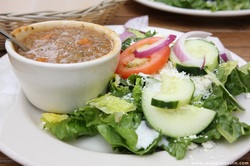 You're invited to the annual Soup, Salad, and Dessert Dinner at First Presbyterian Church of Warren Join us for this great meal, sponsored by the Presbyterian Women. Friday, March 30, 2012 from 4:30 – 7:00 pm Adults and Youth $8.00 Children 6-11 years $3.00 Children 3-5 years $1.00 For further information call the Church Office at 586-751-1721 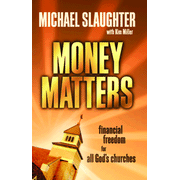 Last year Pastor Emma held a class called “Money Matters: Financial Freedom for All God’s Children" by Michael Slaughter. I did not know at the time what it was all about, I just knew that it sounded like something I needed to attend at this stage in my life. At the end of 2008 I realized just how much money I lost from my savings when the market went south, a lot of administrative jobs at the company I retired from were being sent to Manila, and a lot of folks lost jobs and it will be years before we recover from this financial nightmare. In 2007 my home was worth $175,000 and my savings looked very good. At the end of 2010 my home was worth about $70,000 and my savings looked grim. I was (am) not sure if what I have left will last me all through retirement. It was time to take a long hard look at my money and what I am doing with it. This class brought me the realization that I spend too much and that I did not have a true picture of where my money was going on a monthly basis. Emma shared an Excel home budget template with the class and I found that very useful. The class was not only about our own personal Money Matters but covered the Money Matters of the Church as well and how our contributions help the church grow. The book made me aware of “things” I’d bought that I really did not need at all and using credit cards that I should not have used. We cannot take “things’ to heaven with us, just the knowledge that we hopefully lived our lives well. It was so easy to pledge what I thought that I could afford to my Church but realized that if I cut back on unnecessary spending that I could in fact pledge more to my church to be used for God’s work instead of “things” sitting in a closet that I had not eve used yet. We talked about the snowball effect on finances, paying all the small bills first and then taking those dollars and adding them to the bigger balances until one day the financial picture looks a lot better. That is where I am now and it is scary taking a long hard look at where my money goes. I am not in a position to fully give 10% to God, at least not yet, but it just may be a new goal in my life to get there. The book and the class showed us how to do God’s math, which is based on spiritual principles found in Scripture. God’s math results in: Debt-Free Living, Focus & Planning A Disciplined Lifestyle Easy Simplicity Surrender & Trust Creating versus Consuming Stewardship versus Ownership Generosity I created my own financial problems and I hope that after sitting in the class and reading the book that someday I can look back and remember what I learned and learn from it. It will take time and there are times right now when I see a “thing” that I want and in some cases I walk away and say to myself “you don’t need that.” I did end up pledging a few more dollars to Church this year and that gave me a good feeling to make it a part of my “budget” for 2012. I ask God to help me get through this year and to help me make good financial decisions so that I can be prepared for those uncontrollable expenses that come up now and then. Gloria Stanley
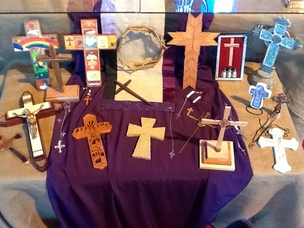 Jesus said, "take up your cross and follow me." This season, we are focusing on the cross and the importance of its symbol to our Christian journey. The way of the cross is about sacrifice and choosing to do for others instead of for ourselves. Members of the congregation were invited to bring in crosses that are important to them for this display in front of our communion table. There are crosses that we wear on jewelry, crosses that depict the Last Supper, crosses that inspire us, crosses that remind us of the pain of the crucifixion. Seeing these crosses each week during Lent directs our focus to a life of discipleship marked by service and sacrifice. We hope that by Palm Sunday, the table will be overflowing with crosses that represent our faith and our shared Lenten journey as a community. Pastor Emma  As Lent begins, we start once more on a journey of reflection and repentance. The scriptures that lead us into Lent this year are all "watery" ones. We read about the days after the flood, when God sets a rainbow in the sky to remember God's promise never to destroy the earth again. We read read about Jesus' baptism, and then his time in the desert before he begins his ministry. To reflect on these scriptures, we will start our Lenten journey by remembering our own baptism. Of, if you haven't been baptized yet, contemplating what that sacrament means. On February 26, the first Sunday of Lent, we will participate in a ritual in worship to remember the waters of baptism. We never "re-baptize," but we do need times to remember our part of the baptismal covenant in which we promise to follow Jesus Christ. During worship, everyone will be invited to come plunge their hands into the baptismal font, remembering that we die to sin as our hands go down into the water, and that we are raised with Christ as our hands come out of the bowl. Elders will then serve us by drying our hands. Today, we reflected briefly on the many candles we use in worship, one of which is a baptismal candle. We ask all those children and adults who have been baptized in the church to light that candle each year on the anniversary of their baptism. That simple act reminds us that Christ is the center of our lives and His light goes with us wherever life takes us. After the worship service, a man came up to speak with me. Glen is in his eighties and I baptized him in January of 2011. He said, "I wanted you to know that I lit my baptismal candle this year on January 9. I remembered my baptism." I was amazed and so thankful that people of all ages value that action and take seriously the meaning of baptism throughout our lives. Baptism also sets us on the journey of discipleship. It is the beginning of the journey and God's act toward us that allows us to strengthen our faith and our discipleship. After we remember our baptisms, everyone at First Presbyterian Church will be encouraged to take on a spiritual practice during Lent. Instead of giving up chocolate or potato chips, try adding one small thing to your daily life that will shape your faith, and may even transform it. Materials will be available at the church to help you pick the right spiritual practice for you. Choose a daily devotional guide, read the daily Lectionary scriptures, do an online devotional at www.d365.org, save change each day for the One Great Hour of Sharing Offering or make a commitment to pray each time you or your family sit down for a meal. Pastor Emma |
Archives
February 2022
Categories
All
|
||||||||||||||||||||||||||||||
First Presbyterian Church of Warren
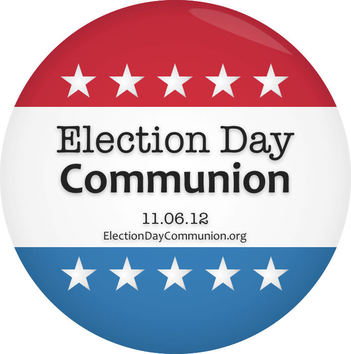
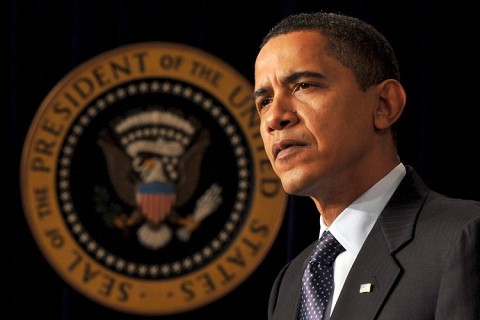
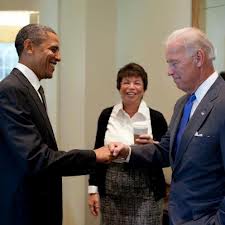



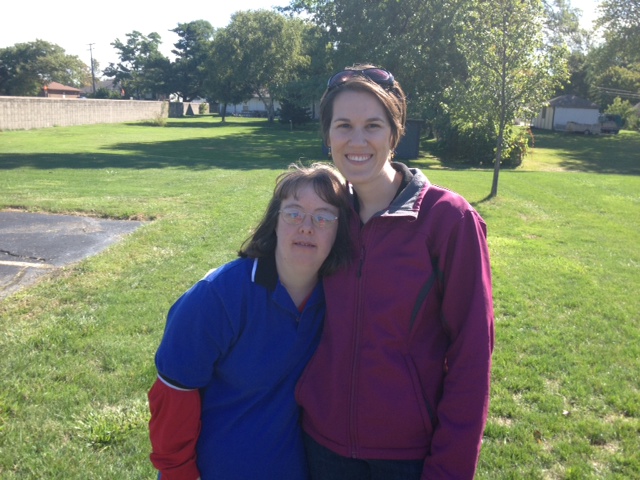
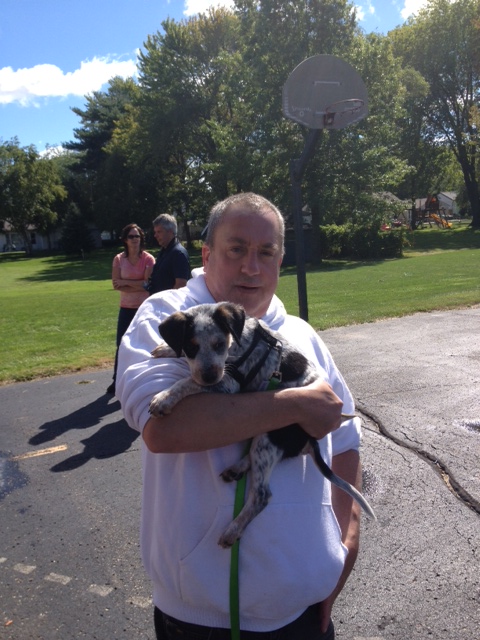
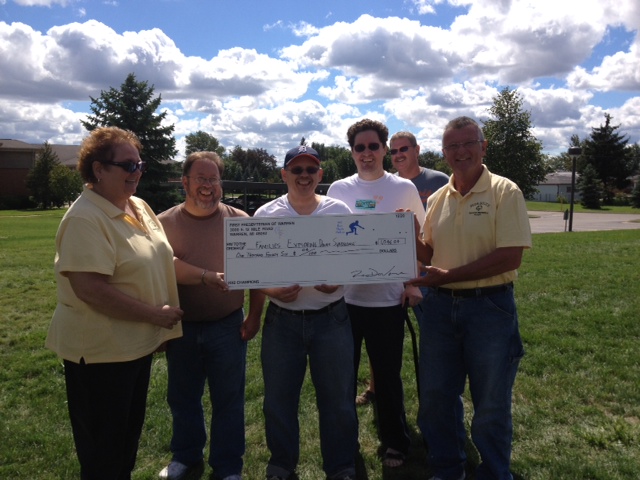
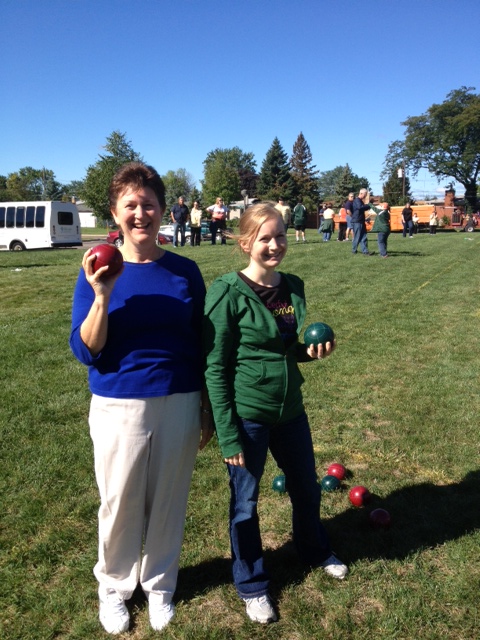
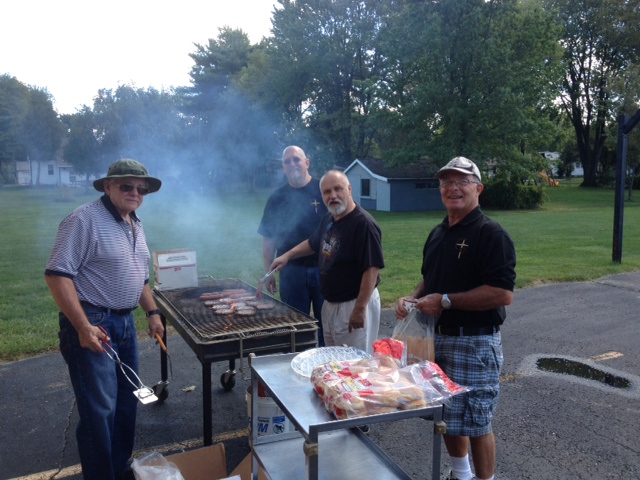
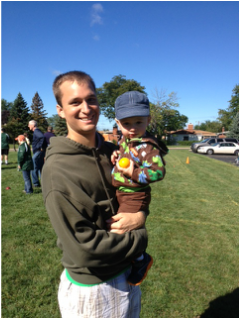
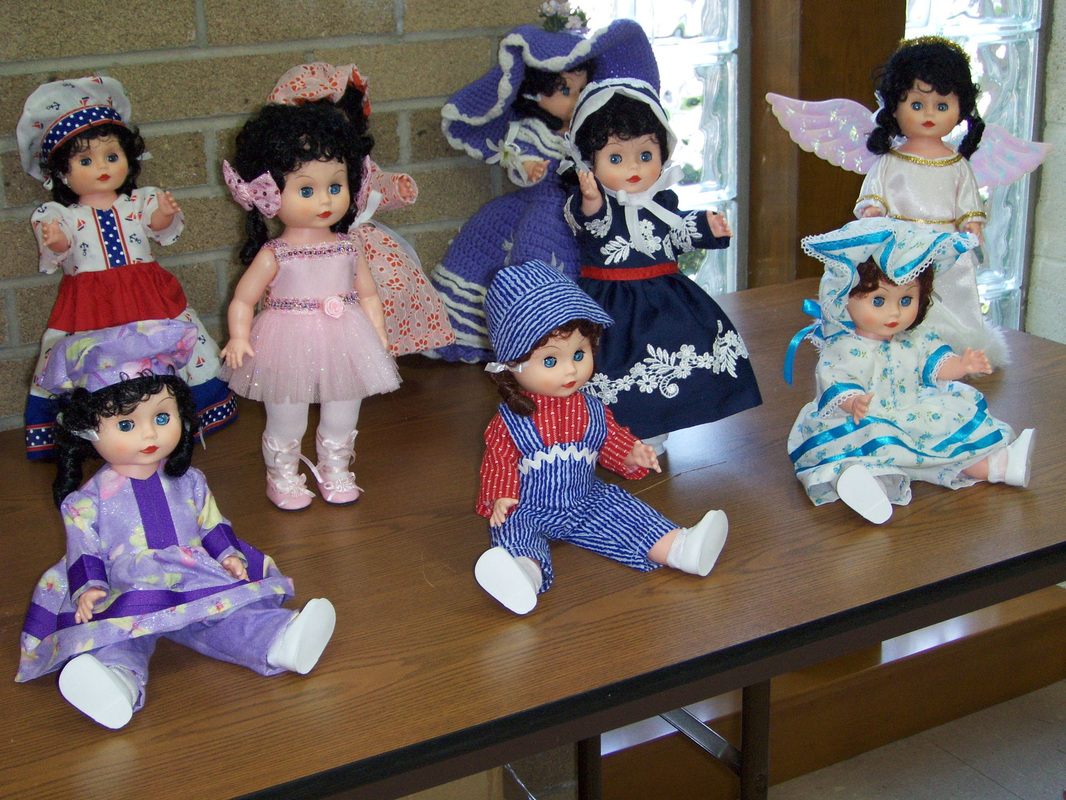
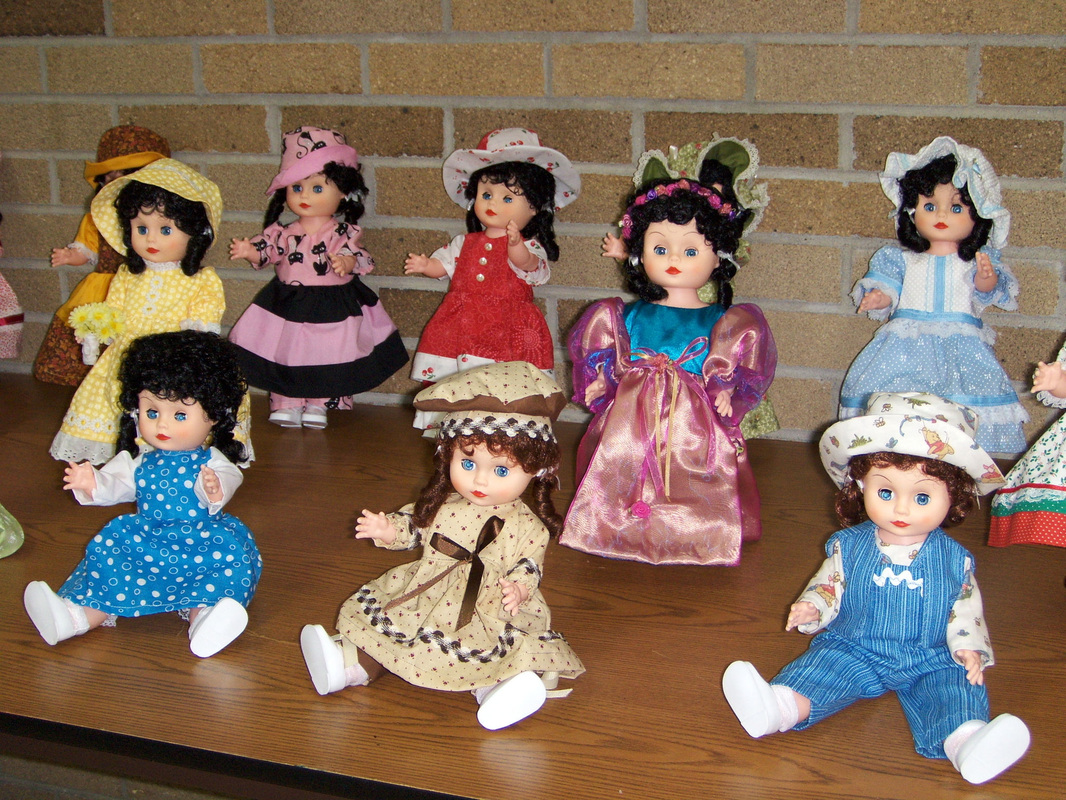
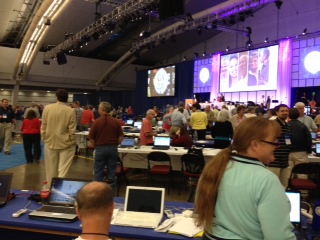
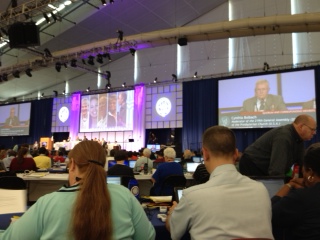
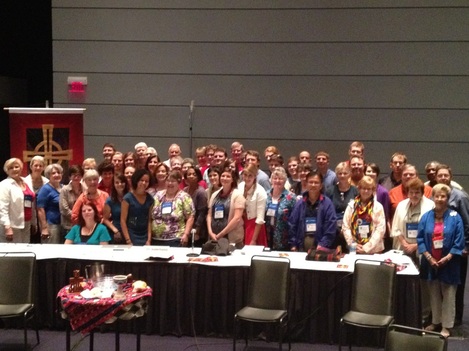




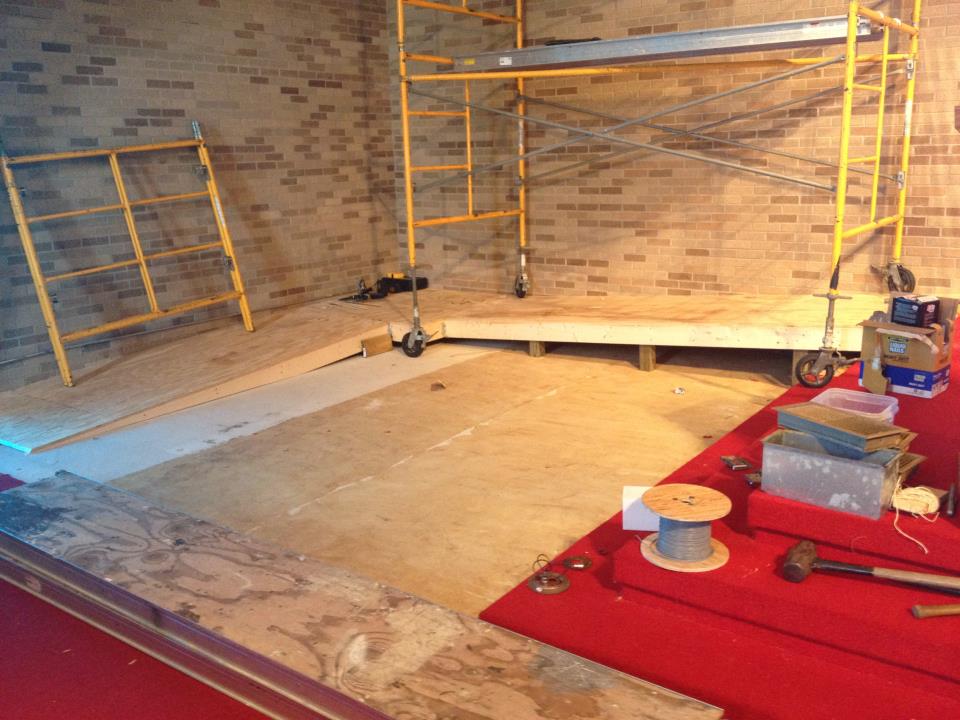
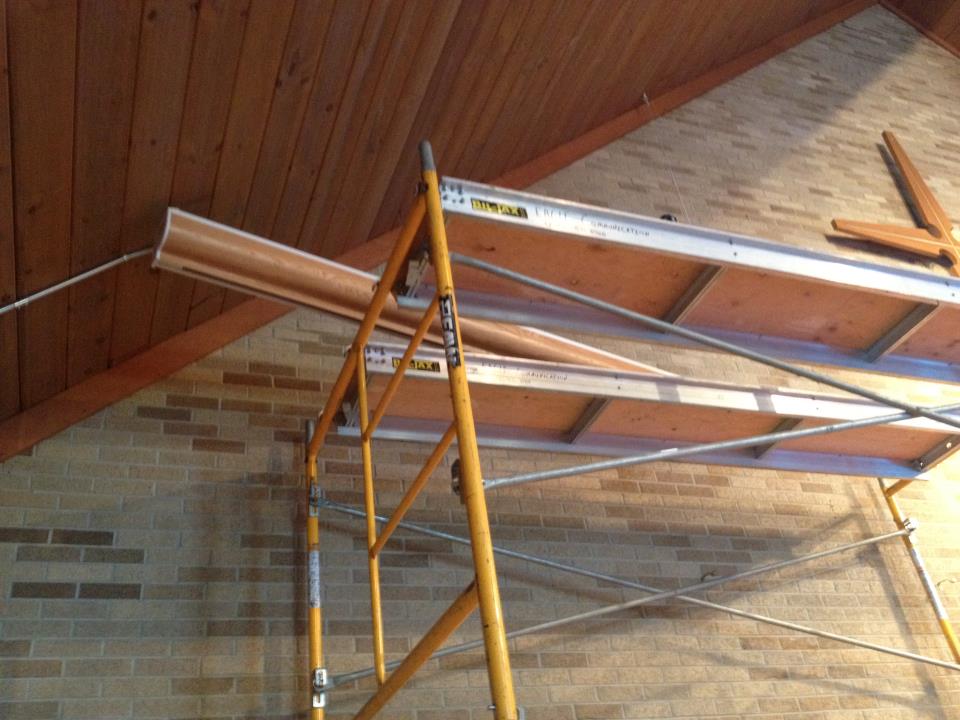
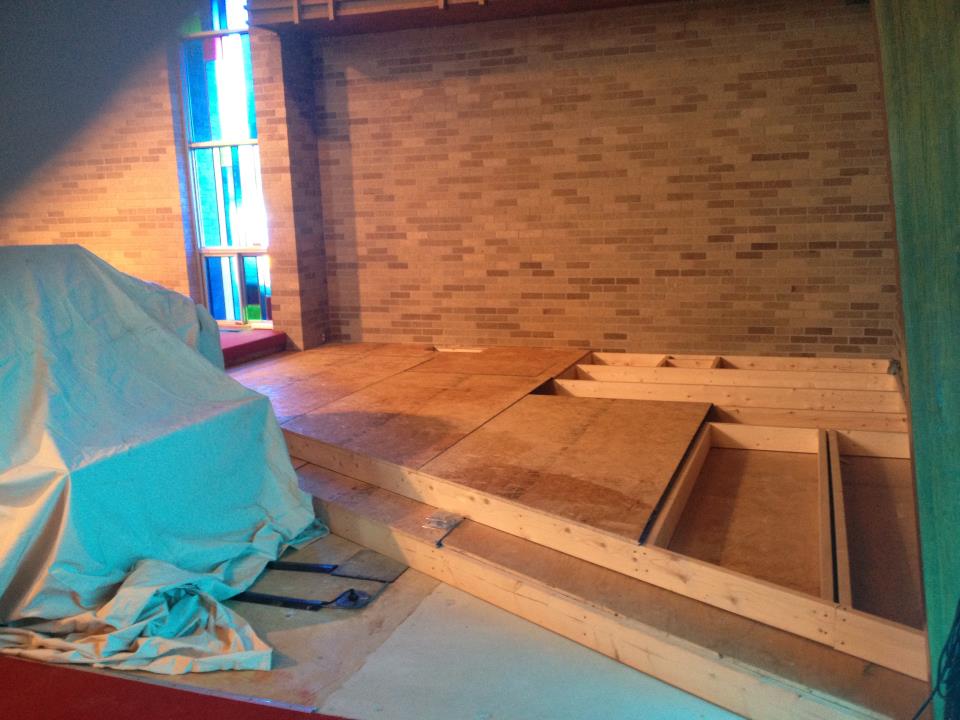
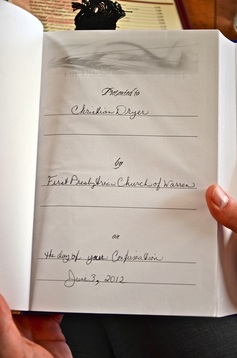
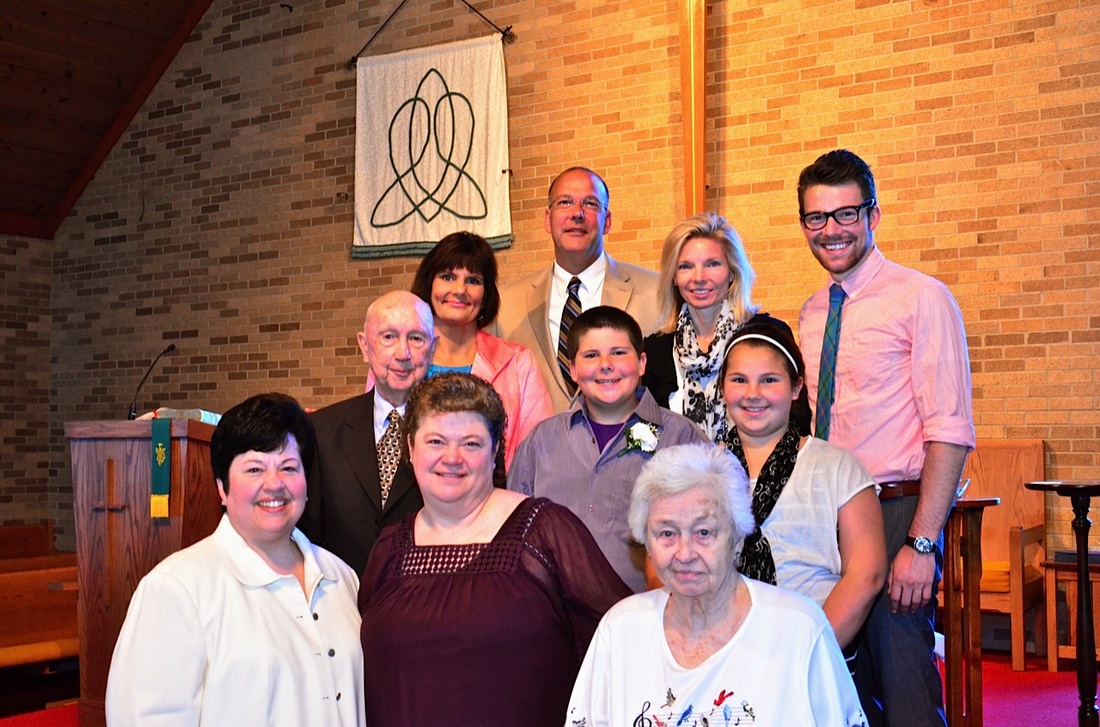
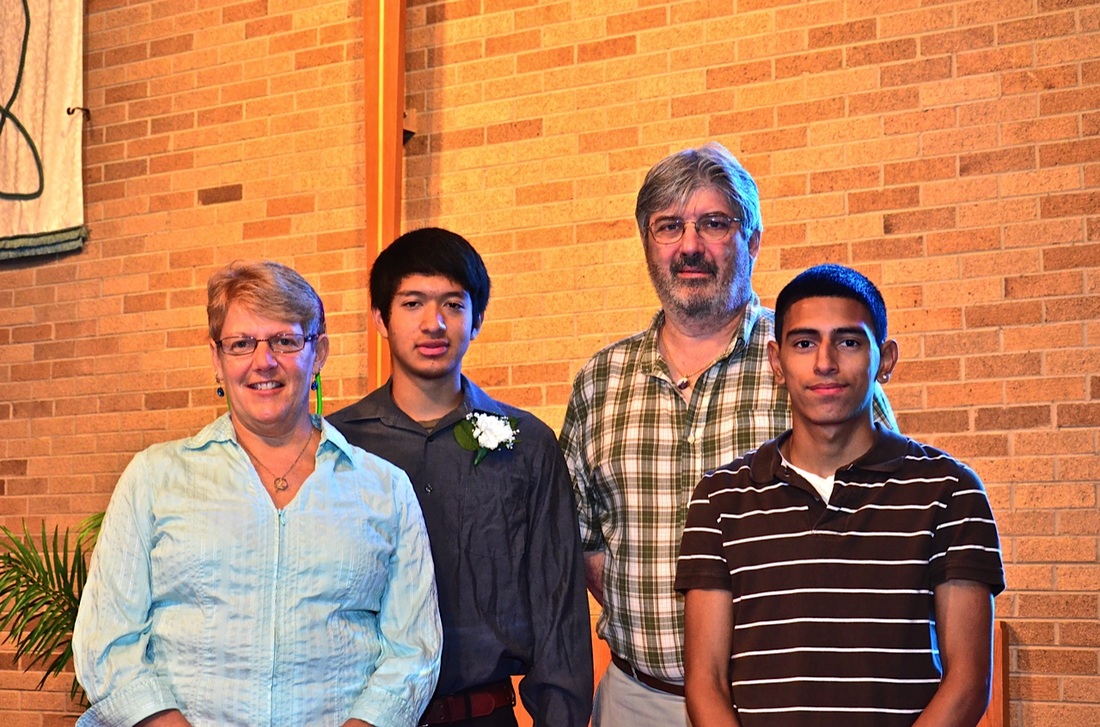
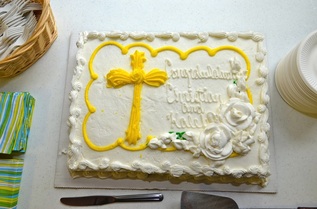
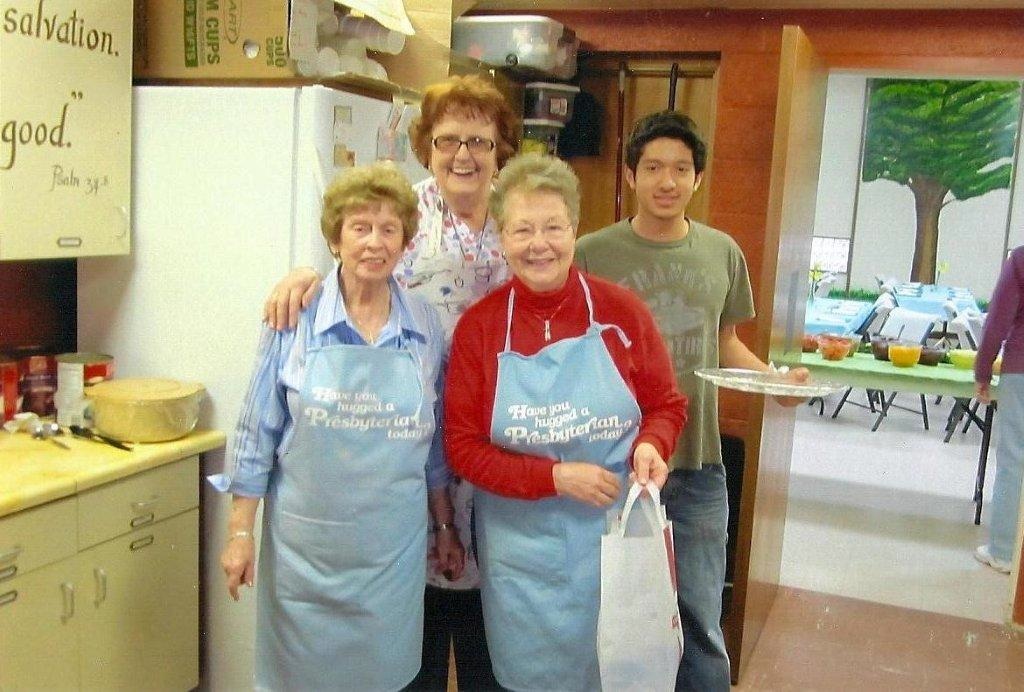
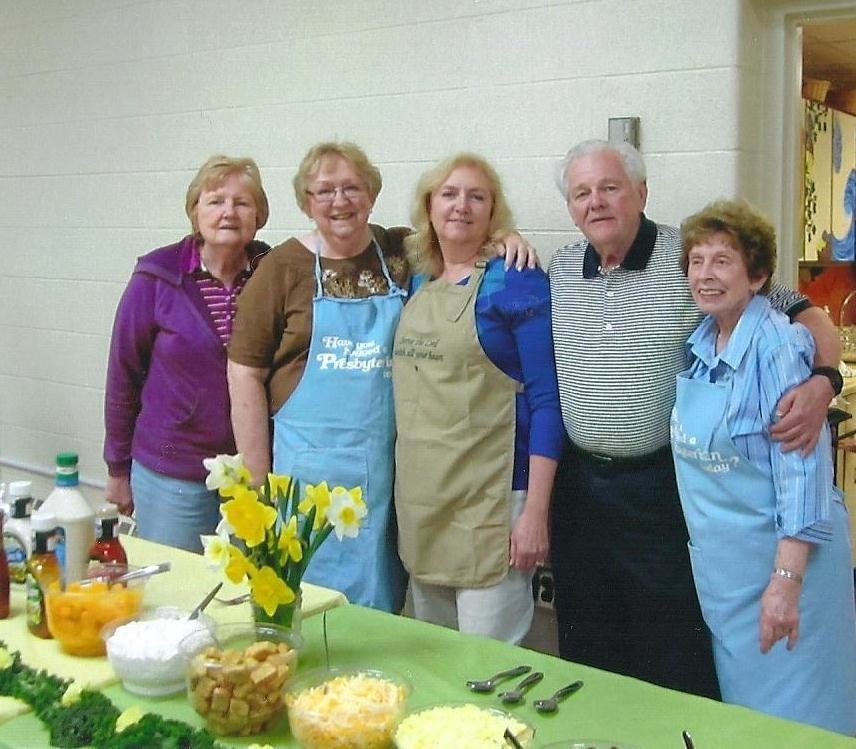
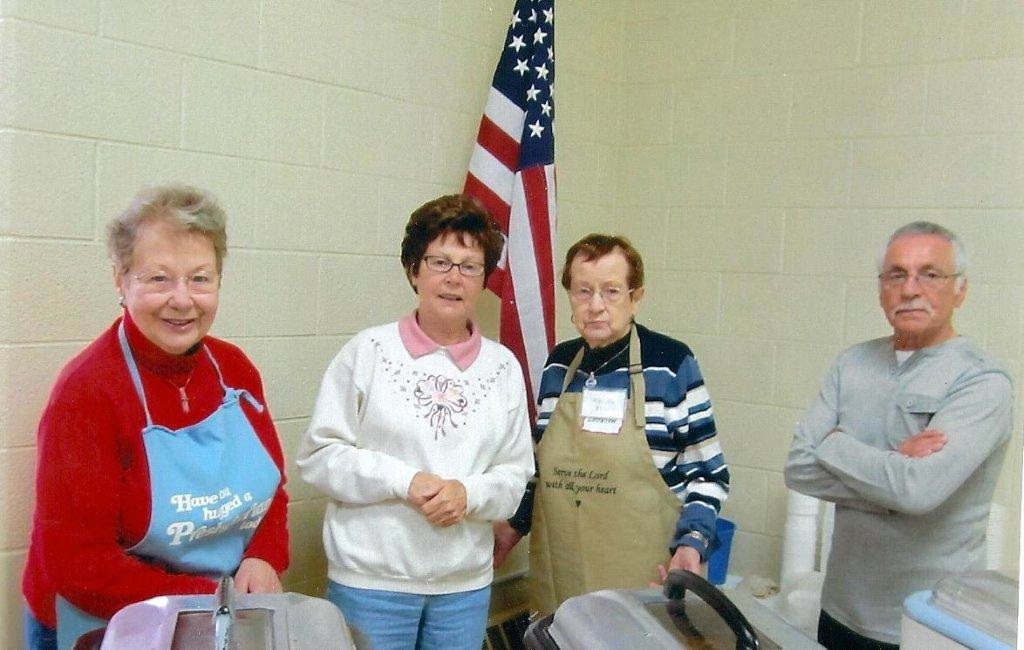
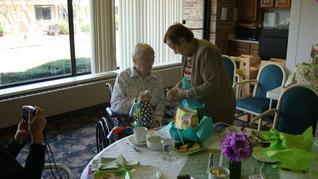
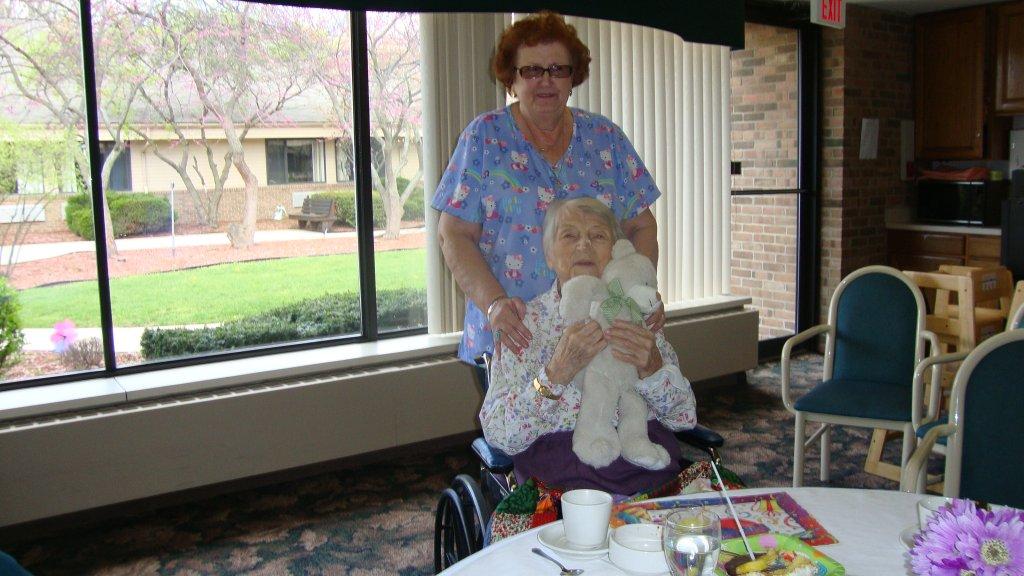
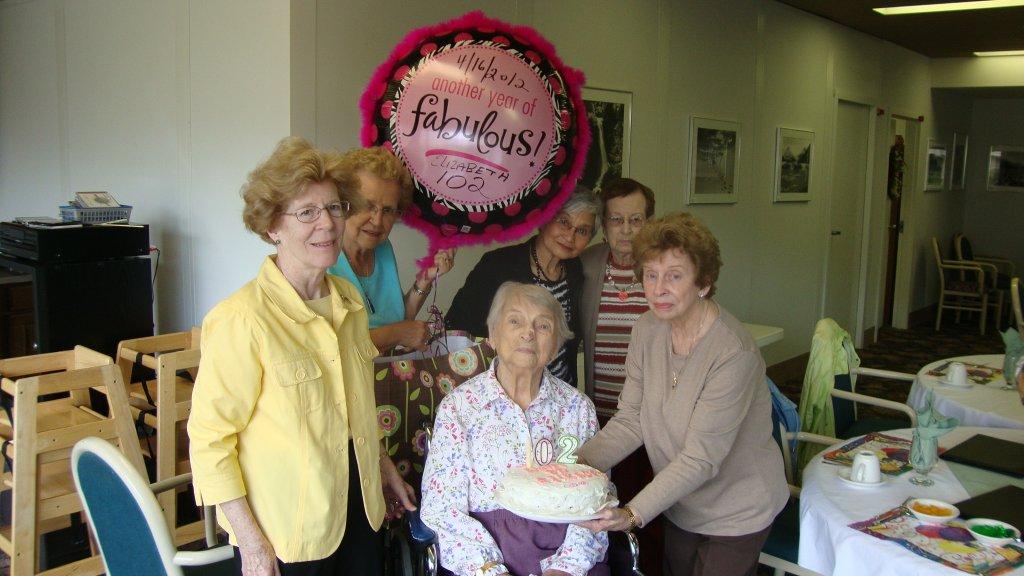
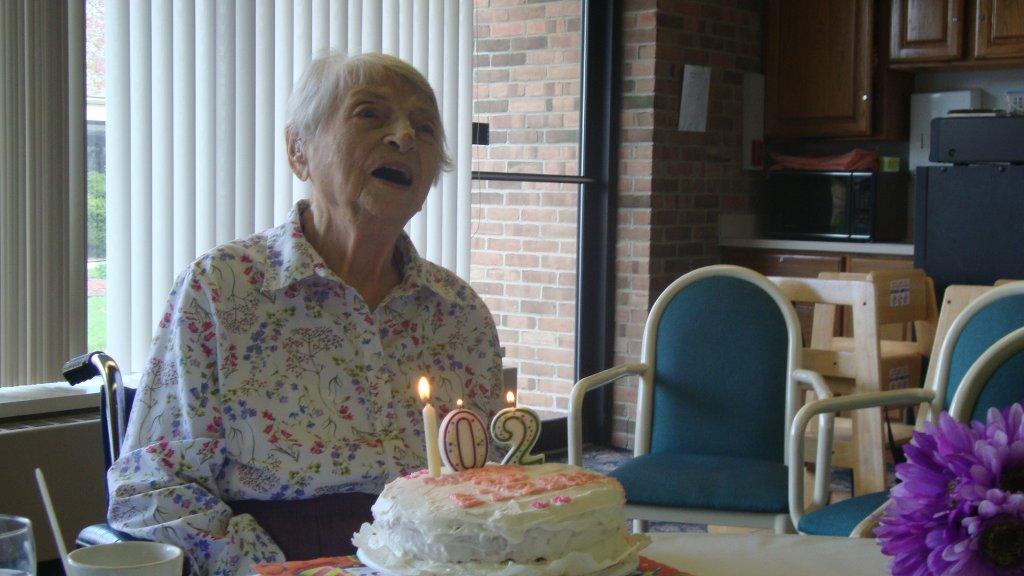



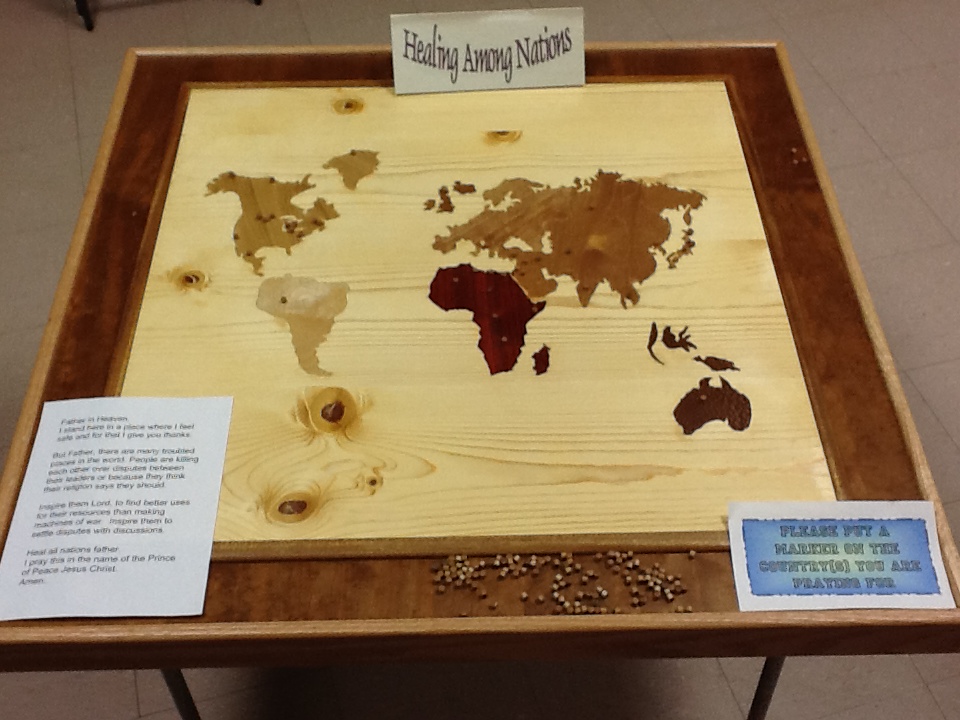
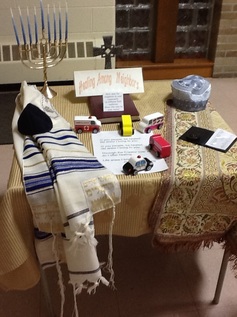
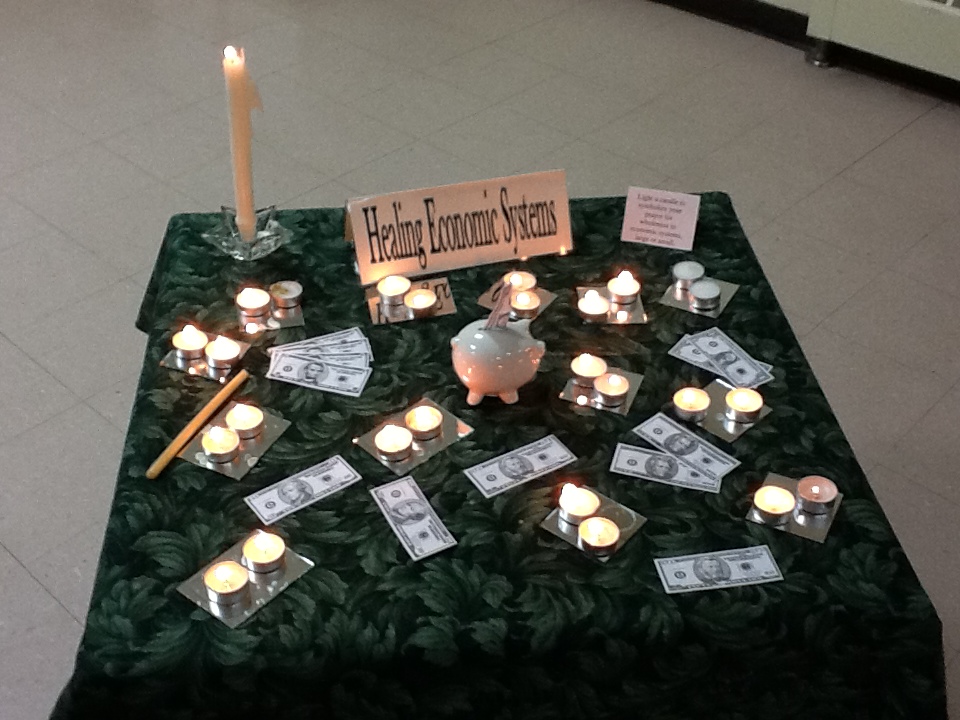
 RSS Feed
RSS Feed
